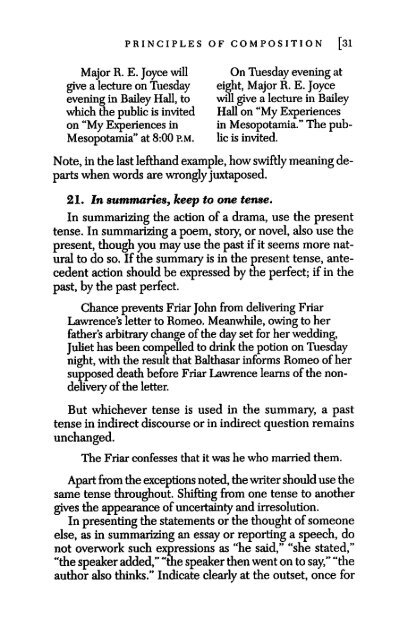You also want an ePaper? Increase the reach of your titles
YUMPU automatically turns print PDFs into web optimized ePapers that Google loves.
P R I N C I P L E S O F C O M P O S I T I O N [ 3 1<br />
Major R. E. Joyce will On Tuesday evening at<br />
give a lecture on Tuesday eight, Major R. E. Joyce<br />
evening in Bailey Hall, to will give a lecture in Bailey<br />
which the public is invited Hall on "My Experiences<br />
on "My Experiences in in Mesopotamia." <strong>The</strong> pub-<br />
Mesopotamia" at 8:00 P.M. lie is invited.<br />
Note, in the last lefthand example, how swiftly meaning de<br />
parts when words are wrongly juxtaposed.<br />
21. In summaries, keep to one tense.<br />
In summarizing the action of a drama, use the present<br />
tense. In summarizing a poem, story, or novel, also use the<br />
present, though you may use the past if it seems more nat<br />
ural to do so. If the summary is in the present tense, ante<br />
cedent action should be expressed by die perfect; if in the<br />
past, by the past perfect.<br />
Chance prevents Friar John from delivering Friar<br />
Lawrence's letter to Romeo. Meanwhile, owing to her<br />
fathers arbitrary change of the day set for her wedding,<br />
Juliet has been compelled to drink the potion on Tuesday<br />
night, with the result that Balthasar informs Romeo of her<br />
supposed death before Friar Lawrence learns of the non<br />
delivery of the letter.<br />
But whichever tense is used in the summary, a past<br />
tense in indirect discourse or in indirect question remains<br />
unchanged.<br />
<strong>The</strong> Friar confesses that it was he who married them.<br />
Apart from the exceptions noted, the writer should use the<br />
same tense throughout. Shifting from one tense to another<br />
gives the appearance of uncertainty and irresolution.<br />
In presenting the statements or the thought of someone<br />
else, as in summarizing an essay or reporting a speech, do<br />
not overwork such expressions as "he said," "she stated,"<br />
"the speaker added," "the speaker then went on to say," "the<br />
author also thinks." Indicate clearly at the outset, once for


